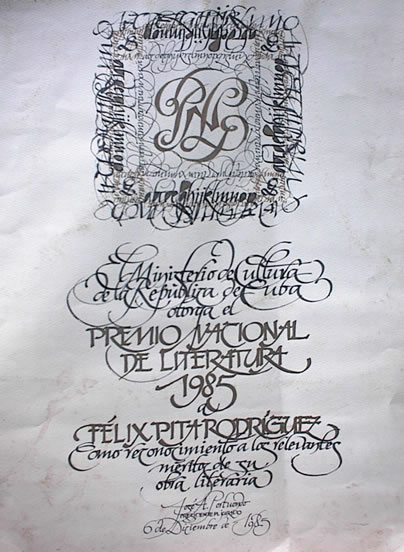4.1.1.19.5 “Historia tan natural”, 1970 and “Tarot of poetry”, 1971-1972, by Félix Pita Rodríguez

In the poetry collections “Historia tan natural” and “Tarot de la poesía” (Tarot of Poetry), Félix Pita Rodríguez recovers the expressive potential he had already realized during the Republic; but without abandoning the connection he had established with the social vibrations of his time. The poet’s subjectivity is enriched by these motivations, which intertwine with his poetics of the unconscious and a humor of new nuances.
However, these poems appear more anchored in the experiential, with a certain colloquial tone, which highlights a lyrical subject in dialogue with his circumstances, sometimes immersed in a sensualism that seeks to merge with nature and find its roots there, especially those that make up the notebook of “Historia tan natural”, with a phylogenetic sense transposed to the lyrical.
In this work, the purely literary constitutes a subject of recreation, in whose framework the author immerses himself in search of topics, characters, authors, which he interweaves to capture his particular sensitivity, with old foundations but renewed in the island context, of a more diluted surrealism and with the humor that has increasingly adopted the Creole character.
The so-called sentimental irony, akin to the poetics of José Zacarías Tallet, emerges from the depths of Félix Pita’s worldview, especially regarding the topic of death and the poet’s immanent rebellion against the prospect of the annulment of the self, as reflected in this poem that is part of “Tarot of Poetry”:
“I wouldn’t want to die”
when I’m already living
the backpack is empty.
I don’t want to leave here.
uninhabited inside,
no longer seeking or wanting,
next to a closed door
dozing.
I want to leave hungry and thirsty,
even wanting and desiring.
That when he comes he finds me
wandering along a path,
with the cigar in his mouth,
the shoes on the feet,
something looking for.
I don’t want to receive it
Like a consolation waiting
sighing.
That I want to die
with death for my life
fighting.”
In these last texts, Félix Pita Rodríguez manages to concretize a poetics encouraged by popular wisdom, but the fruit of an authentic apprehension of reality, for which he draws on diverse lyrical currents and demonstrates the assimilation of different literary models, among them the universal one of Antonio Machado.
The poet here culminates a highly fruitful career, in which he has successfully combined the poetic milieu of his time—from his emergence as an avant-garde movement during the movement’s heyday to his foray into social circles during the period of revolutionary ferment—with his own ethical and aesthetic concerns, the legacy of which is the result of one of the most original voices in our poetic scene.








